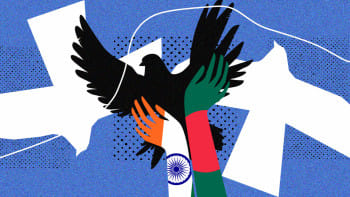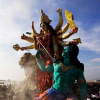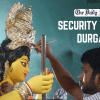Bangladeshis know how to shape their destiny

The recent controversy involving the Bangladesh chapter of the International Society for Krishna Consciousness (ISKCON) has underlined the country's challenges in maintaining its legacy of tolerance in the aftermath of Prime Minister Sheikh Hasina's ouster who has been provided shelter in India. Misrepresentation by some media outlets of the arrest of ISKCON leader Chinmoy Krishna Das Brahmachari and the tragic death of Advocate Saiful Islam Alif on November 26 has fuelled debates about communal harmony in Bangladesh.
Bangladesh is the world's eighth-most populous country and 35th-largest economy. It is the second-largest exporter of ready-made garments (RMG) and home to BRAC, the world's largest NGO, and Grameen Bank, founded by Nobel Laureate Prof Muhammad Yunus, a pioneer of microcredit finance and head of the interim caretaker government. Following Hasina's departure, concerns have emerged in certain quarters over the resurgence of Islamist political parties and whether Bangladesh could shift toward theocracy in a nation where over 90 percent of the population is Muslim. There have also been some comparisons with Pakistan and Afghanistan.
The story of Bangladesh's independence is rooted in a struggle against communal identity imposed by the then-Pakistani rulers. Unlike Pakistan, where religious ideologies are central in shaping governance structures, Bangladesh's identity is anchored in Bengali nationalism. During the Liberation War of 1971, Bangladeshis emphasised linguistic and cultural distinctiveness rather than religious uniformity.
The call for autonomy, often symbolised by the term "Bangladeshi" since the early 1960s, reflects this desire for a unique national identity. This historic resistance reinforces Bangladesh's foundation built on cultural plurality and assertion of a distinct Bengali identity, which continues to shape its political and social landscape even today.
The recent unrest centres on a public demonstration held by ISKCON members, during which a saffron flag—often associated with Hindu nationalism—was hoisted above the national flag of Bangladesh at a rally in Chittagong on October 25. This act was widely condemned as a violation of national sovereignty and an affront to the country's secular identity, leading to the Brahmachari's arrest.
The situation escalated when ISKCON's supporters, reportedly enraged by the court's decision to deny bail to Brahmachari, surrounded a prison van and began protesting. These protests quickly turned violent, with demonstrators allegedly vandalising vehicles, throwing brickbats, and causing damage to public property, including windows at the court mosque complex.
During the clashes, Advocate Saiful Islam Alif, a member of the Chittagong Bar Association, was killed and his body was desecrated, which further inflamed public sentiment.
Bangladesh's constitution uniquely balances secular principles with Islam as the state religion. The Supreme Court's 2016 judgment reinforced that Islam's recognition does not contradict the state's secular obligations and that all religious communities must enjoy equal protection and rights under the law. The social fabric reflects this balance, visible in the shared courtyards between mosques and temples in regions like Lalmonirhat.
While communal tensions can arise in Bangladesh, like in other parts of South Asia, international media often misrepresent these incidents, overlooking Bangladesh's commendable, if not perfect, track record in upholding and promoting tolerance. Reports exaggerating the situation, such as claims of systematic suppression of Hindu organisations, ignore the local context and Bangladesh's unique socio-cultural identity.
Bangladesh's constitution uniquely balances secular principles with Islam as the state religion. The Supreme Court's 2016 judgment reinforced that Islam's recognition does not contradict the state's secular obligations and that all religious communities must enjoy equal protection and rights under the law. The social fabric reflects this balance, visible in the shared courtyards between mosques and temples in regions like Lalmonirhat.
Bangladeshis are known for their moderate, devout faith and progressive outlook. Influenced by Sufi traditions, the country's religious landscape promotes spiritualism and peaceful coexistence, contrasting with hardline interpretations in some neighbouring regions. The state's emphasis on religious neutrality ensures respect for religion without it dictating public life, in sharp contrast with the theocratic shift in countries like Afghanistan. Even during the political turmoil following Sheikh Hasina's ouster, community leaders and students have united to protect the religious sites of the minorities.
Despite the emergence of radicalism in many parts of the world, these sentiments remain on the fringe and have not received widespread support in secular Bangladesh. Counterterrorism efforts have dismantled networks like Jama'atul Mujahideen Bangladesh (JMB) and Harkat-ul-Jihad-al Islami Bangladesh (HuJI-B), preventing the rise of a unified Islamist front.
This resilience stems partly from Bangladesh's experience with extremist violence, such as the 2016 Holey Artisan Bakery attack. The state's firm response, combined with the community's rejection of extremist ideologies has ensured that such an incident has not occurred since.
The interim government's emphasis has also been on maintaining order and safeguarding minority communities. Both Professor Yunus and Army Chief General Waker-Uz-Zaman visited several temples and shrines ahead of Durga Puja. Except for a few isolated incidents in a country of nearly 180 million, attacks on minorities, including Hindus, have been limited and largely neutralised. Hence, structural conditions and public sentiment in Bangladesh do not favour a Taliban-style takeover or Pakistani-style quasi-military rule under the cloak of so-called democracy.
In addition, the country's vigorous engagement in international peacekeeping missions highlights its commitment to stability beyond its borders. While Afghanistan's governance has often been marked by shifts between authoritarianism and radicalism, Bangladesh's trajectory has been one of balancing democratic aspirations with a firm stance against militancy.
If religion alone could shape a state's trajectory, Bangladesh would not have parted ways with Pakistan. Instead, people's free-spirited nature and a rich tradition of cultural celebration have created a space where being devout doesn't conflict with being open-minded and progressive. Bangladeshis have trod this path with blood and sweat since February 21, 1952, when martyrs gave their lives to resist Urdu being imposed as the national language by Muhammad Ali Jinnah until Bangladeshis liberated the country in 1971. Today, February 21 is universally observed as International Mother Language Day.
As the interim government steers the country towards elections, the challenges it faces are real, but the strengths it possesses are equally significant. While vigilance is necessary, the core values that have shaped Bangladesh's independence remain its greatest asset in navigating these uncertain times with cautious optimism. There is no need for anybody, regionally or globally, to be overly concerned as history shows, despite setbacks and challenges, Bangladeshis know how to shape their destiny.
This article was originally published in the opinion column of The Indian Express on December 2, 2024.
Prof Syed Munir Khasru is chairman of the Institute for Policy, Advocacy, and Governance (IPAG), an international think tank.
Views expressed in this article are the author's own.
Follow The Daily Star Opinion on Facebook for the latest opinions, commentaries and analyses by experts and professionals. To contribute your article or letter to The Daily Star Opinion, see our guidelines for submission.

 For all latest news, follow The Daily Star's Google News channel.
For all latest news, follow The Daily Star's Google News channel. 










Comments